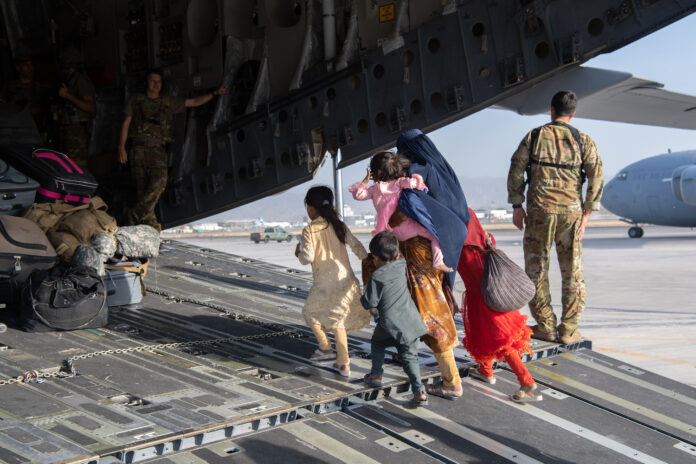The United States officially concluded its military mission in Afghanistan on Monday, bringing a turbulent end to the two-decade long war that killed tens of thousands of people and cost Washington over $2 trillion.“The military mission is over,” U.S. Secretary of State Antony Blinken declared on Monday evening. “A new diplomatic mission has begun.”
The Taliban retook Afghanistan at a pace that stunned U.S. officials and fueled concerns about Washington’s ability to evacuate its citizens and its Afghan allies, many of whom sought to flee in harrowing scenes from the Kabul airport. With the departure of the last U.S. troops, 123,000 people have been evacuated—but tens of thousands of Afghans who aided the United States remain in the country, facing an uncertain future.
Left behind? The U.S. war has ended, but many Afghans still face a nightmare. As many as 250,000 Afghans who worked with the United States and may qualify for expedited U.S. visas were not evacuated and remain at risk of retaliation. And it’s not just the United States that halted its flights: the United Kingdom, Germany, and France also ended their civilian evacuations.
The Biden administration says it’s not finished. “After August 31st, we will make sure there is safe passage for any American citizen, any legal permanent resident,” U.S. National Security Advisor Jake Sullivan said on Sunday. “We will ensure the safe passage of those Afghans who helped us to continue coming out after the 31st of August.”
But many activists and aid groups fear that this safe passage will be difficult—even impossible—under Taliban rule, especially when the United States initially could not even guarantee U.S. citizens safe transit to the Kabul airport in mid-August, after the Taliban takeover.
Moreover, Afghans who apply for special immigrant visas (SIVs) to the United States face a broken system that has left thousands in the lurch. The SIV program for Afghans already has a backlog of 18,000 cases, and the true number of applicants could be as great as 80,000.
One promising sign: Following the U.S. withdrawal, 98 countries including the United States have pledged to continue taking in Afghans. China and Russia, which have aligned themselves with the Taliban, are missing from the list.
The Taliban government takes shape. The Taliban will establish a 12-man council to rule Afghanistan in the wake of U.S. withdrawal, as Lynne O’Donnell reported in Foreign Policy last week. The council’s three most powerful members are responsible for some of the most brutal acts of terrorism of the past two decades. They jointly represent one of the world’s largest criminal cartels.
Although the Taliban has said they will not seek retribution against supporters of the previous government, the group’s actions speak louder than its words for many Afghans. “They searched my office, they went to my house, they shot a cousin, beat up another,” a former Afghan defense official told FP. “They have beaten people, shot people, people are disappearing.”
New threats. Islamic State-Khorasan, the Islamic State’s Afghan branch, also poses a serious threat. After the group claimed responsibility for attacks at the Kabul airport that killed over 170 Afghans and 13 U.S. service members last Thursday, Washington warned of a future threat. “This strike was not the last,” Biden declared. “We will continue to hunt down any person involved in that heinous attack and make them pay.”
Civilian casualties. But it’s unclear whether Washington and its allies have managed to correctly identify and target the perpetrators or protect innocent civilians.
Although a U.S. drone strike on Friday reportedly killed the planner of the airport bombing, another apparent drone strike in Kabul on Sunday killed 10 people, who appear to have no connection to militant groups.
Zemari Ahmadi, the driver of the car struck by the missile worked for a U.S. based charity. The strike also killed a contractor for the U.S. military and several young children as they ran to greet the arriving vehicle. Faced with the reports of civilian casualties, the Pentagon said:“We’re not in a position to dispute it.”




